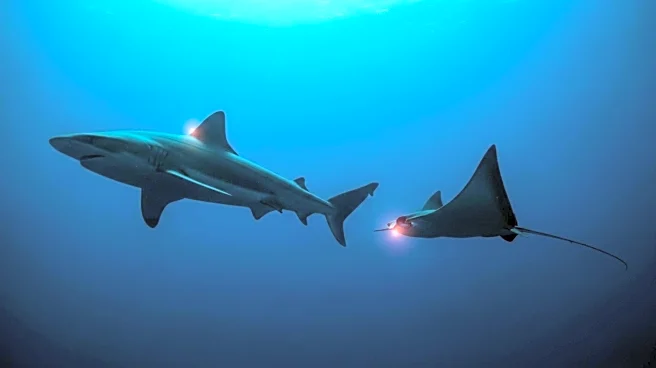What is the story about?
What's Happening?
New research led by oceanographers at the University of Hawai'i at Mānoa has identified a significant threat to 30 species of sharks, rays, and chimaeras, also known as ghost sharks, due to proposed deep-sea mining activities. Published in *Current Biology*, the study highlights that the habitats of these species overlap with areas designated for potential mining, which could exacerbate their risk of extinction. The research team, led by Aaron Judah, used global species range maps and mining zone data to assess the vulnerability of these marine animals. The study found that nearly two-thirds of these species are already threatened by human activities, and the disruption caused by mining could further endanger them. The research emphasizes the need for conservation measures to protect these species, which play a crucial role in ocean ecosystems and hold cultural significance.
Why It's Important?
The findings underscore the potential ecological impact of deep-sea mining, a burgeoning industry that could have far-reaching consequences for marine biodiversity. Sharks and their relatives are among the most threatened vertebrate groups, primarily due to overfishing. The introduction of mining-related disturbances could compound these threats, leading to further declines in populations. This situation poses a challenge for environmental policymakers and conservationists, who must balance economic interests with the preservation of marine life. The study's recommendations for monitoring and impact assessments could inform regulatory frameworks and help mitigate the adverse effects of mining on these vulnerable species.
What's Next?
The study suggests several conservation strategies, including the establishment of monitoring programs and the inclusion of these species in environmental impact assessments. These measures could be adopted by the International Seabed Authority and mining contractors to ensure that the ecological risks are minimized. As deep-sea mining activities are poised to begin in areas like the Clarion-Clipperton Zone, ongoing research and policy development will be crucial in safeguarding marine ecosystems. The study's authors continue to explore species range extensions, which may identify additional at-risk species, further informing conservation efforts.
Beyond the Headlines
The potential impact of deep-sea mining extends beyond immediate ecological concerns, touching on ethical and cultural dimensions. Many of the affected species are integral to the cultural identity of coastal communities, particularly in regions like Hawai'i. The disruption of these species' habitats could have cultural repercussions, affecting traditional practices and local economies reliant on marine biodiversity. This highlights the need for a holistic approach to environmental management that considers both ecological and cultural factors.















